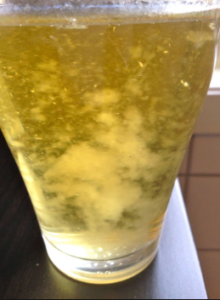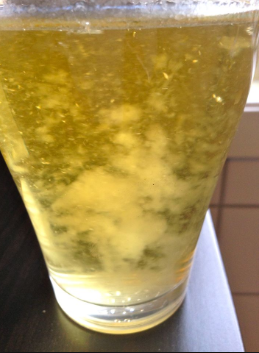White particles or stuff in urine leading to the cloudy or murky appearance can be caused by the presence of mucus, pus, or protein in your urine samples. There is also the probability of the particles being caused by a UTI (urinary tract infection). You should, therefore, consult a medic for a proper diagnosis.

Below, we will look at white stuff in urine, speck, particles, its causes, e.g., pregnancy, meaning, what causes stringy urine, in female, male, NHS, and when to see a doctor.
Your urine should normally have a pale-yellowish color. There are however instances where the presence of white stuff in urine causes it to get a whitish or cloudy-like appearance. The white particles may appear like white floating bits or white sediment depending on what is causing them to appear.
An infection is often characterized by the appearance of white floating particles accompanied by a foul smell in the urine. But it could also be an indication that you need to increase your fluids intake. Increasing fluids intake assists in reducing the concentration of waste products that have been eliminated by the urinary system.
You should typically pee between 1ltr and 2ltrs of urine within a twenty-four period depending on the amounts of fluids that you have taken on that day. Your urine mainly comprises of extra fluids as well as waste products not needed by your body. Urine color can be influenced by:
- Your current health condition
- Foods included in your daily diet
- Total amount of body fluids that have been lost through the sweating process
- Medications
White stuff or particles in urine – what does it mean?
The role of balancing the chemicals and water levels in your body is performed by your urinary system in assistance with other body organs. The same system is also in charge of ensuring that all the waste products are eliminated from your body. What this means is that an adult female could urinate as much as a quart and a half urine in a single day.
The overall amount of fluids taken will affect the total amount of urine that you get to pass on that day. It could also be affected by your breathing and sweating rates. It may come a point where you notice the presence of white speck in urine.
You should not go into panic mode after making this discovery as it is very common for ladies and men to have this particular condition. It is, however, critical to ensure you are checked out if the white particles are accompanied by fever and pain. Sudden emergence of the particles will also require you to visit an ER room as soon as you can.
White bits in urine NHS
According to the NHS, white specks in urine are traditionally caused by urinary tracts infections. The infections are pretty common and are known to affect your kidneys, kidneys, bladder, as well as the connecting tubes. Any person can get this infection though they are more common in females.
There are women who actually experience recurrent urinary tract infections. The infections can be uncomfortable and painful. They should, however, pass within a few days after they have been treated using antibiotics.
UTI symptoms
Lower UTIs (infection of the urethra or cystitis) may cause the emergence of the following symptoms:
- A general feeling of un-wellness and being tired all the time
- Frequent need to urinate
- Urine that is not clear (cloudy) and which is accompanied by a foul smelling. It could contain blood in some cases
- Discomfort or pain when you are urinating
- Pain in your lower tummy
- Sudden urge to pass urine
- Feeling as though you cannot be able to completely empty your bladder
What causes white stuff in urine?
The presence of white particles in urine could be an indication that you have a serious medical condition that should be checked out. There are instances where this does not indicate anything serious as well. It can be caused by:
1. Sediments
Appearance of sediments in alkaline-like urine is frequently linked to phosphate debris. The condition is quite common and should therefore not warrant any worry. The white particles present in your urine may be due to detachment of your urinary tract lining.
Presence of yeast and fungus in your urine could also lead to the development of this particular problem.
2. Kidney related problems
Kidney stones are normally characterized by the appearance of white sand like granules. People who have suffered from kidney stones in the past will have an increased chance of having to deal with a recurrent kidney stone problem. A recurrence of the condition will also affect other areas of your tract and not just the kidneys.
It could lead to the development of varying symptoms and complications in your urinary tract system. Kidney stones could, therefore, be the reason why you are noticing white stuff in urine. A consultation with a qualified medic will be necessary if you suspect that kidney stones are behind the appearance of the white particles.
3. UTI
The color of your urine should ordinarily range between amber and yellow. Your urine should also be free from viruses, bacteria, and fungi, and should only contain the waste products and fluids that are being eliminated from your body. Bacterial infections will normally cause your urine to become cloudy and to appear as though there are white specks that are suspended in it.
It is common for this to occur when Escherichia coli starts attaching to your urethral opening. It is a type of bacterial contamination that begins spreading from the opening of your urethra. Suspected cases of UTI infections should always be reported to your doctor to prevent them from spreading past the kidneys and onto your bladder.
4. Bacterial vaginosis
BV (bacterial vaginosis) occurs when naturally occurring bacteria in your vagina begin spreading too fast. BV symptoms include:
- Vaginal itching
- Foul-fish smelling odor coming from your vagina
- Increase in the amounts of vaginal discharge. The discharge will either be gray or whitish in color.
BV is curable and should be reported as soon as you notice the symptoms. Failure to treat it on time will lead to the development of PIV (pelvic inflammatory disorder).
5. Yeast infection
There is always a small amount of yeast that is present in your vaginal tract at any one given time. But there are times when this yeast may start growing at alarming rates leading to the development of a yeast infection. The increase in the growth rate can be caused by changing pH levels in your vaginal tract.
Symptoms associated with the yeast infection will include:
- Itching and burning sensation accompanied with redness in your vaginal region
- Increase in the amounts of your vaginal discharge
- Clumpy, white discharge with a cottage cheese like appearance
Yeast infection treatment options often focus on combating this overgrowth rather than in completely eliminating the yeast from your urinary tract system. Antifungal agents are the main types of medications used in the fight against bacterial overgrowth. They can be in the form of tablets, vaginal creams, or suppositories.
White stuff in male urine
The white specks appearing in a man’s urine can be quite scary especially when noticed for the very first time. They should however not bother you much as they tend to be harmless. You will often find that they have been caused by a bacterial infection.
A medic will, however, need to observe a sample of your urine before providing a diagnosis. Antibiotic medication will be prescribed if the cause is found to be bacterial related. The white stuff in urine should disappear within a few days after starting your medication.
Appearance of white particles in your urine may also be caused by a condition known as urolithiasis. It implies that stones are present in the bladder or urine ducts. The condition is treatable and should be reported as soon as possible.
White stuff, particles in female’s urine
There are several factors that may make your urine to contain white suspended specks. Even though this could be indicative of various medical conditions, not all of them tend to be serious. Some instances could indicate that you have an urgent medical condition that requires immediate treatment.
For instance, parasitic infections, e.g., trichomoniasis could lead to increased mucus production that manifests in the form of threads in your urine. Women suffering from candidiasis could also notice white specks in their urine. They could also be present when you have conditions, e.g., polyps and cancer of the bladder.
White particles in urine during pregnancy
Pregnant women could notice white like particles floating in their urine after they have finished peeing. A pregnant has an increased chance of contracting a UTI that may then cause the urine to get a cloudy color. Vaginal discharge will also increase when one is pregnant making the urine to appear as though it has white particles in it.
An increase in your vaginal discharge during pregnancy is meant to ensure that infections do not find their way into your womb, according to doctors from the NHS. Resulting discharge should be white and clear. You should consult your medic if the discharge changes its color or if you experience some itchiness.
White stringy stuff in urine
All individuals have mucus in the urinary tract systems. This mucus can appear in the form of threads, secretions or crystals. It can be found in a woman’s vagina and in the man’s urethra.
The mucus normally originates from your mucous glands and membranes. Mucus threads are very common in urine and are never reported as being abnormal after a urinalysis examination. The presence of excess mucus amounts could indicate an underlying medical condition.
Stringy urine threads can be caused by:
1. Normal discharge
Mucus mainly originates from your bladder as well as the urethra lining. The two membranes are mainly made up of epithelial cells. The mucus will normally flow out with your urine even though you may be unable to see it due to the urine’s refractive powers.
Your urine will have originated from the kidneys. This is where the proteins that are found in the mucus are produced. The proteins will then be carried by the urine as it leaves your kidneys.
2. Irritable bowel syndrome
It is a condition whose causes are yet to be established. People suffering from this condition will not have had their bowels in their normal states within a duration of about six months. Irritable bowel syndrome could also manifest in the form of white stringy threads being observed in the urine.
This mucus threads being noticed in your urine may have come from the excess mucus present in your stool. It is common when an individual urinates and defecates simultaneously.
White stringy particles, stuff in urine female
The amount of vaginal secretions being released by the female body often increases during menstruation and ovulation periods. An increase in vaginal secretions also translates to an increase in the amounts of cervical mucus being produced. Some quantities of the cervical mucus may end up flowing out with your urine.
Ulcerative colitis has also been known to cause the presence of stringy particles in female urine. The condition affects the bowels leading to the emergence of patches of ulcers and erosions in the colon. As a result, excessive mucus ends up being produced by the body.
White stuff, specks or particles in urine – when to see a doctor
You should visit your GP immediately if the white stuff in urine increases or if the symptoms become too severe. Prompt treatment of urinary infections is recommended as they could lead to infertility if not addressed on time. You should also visit a doctor if the white specks in your urine are accompanied by the following symptoms:
- Experience nausea and vomiting
- Frequent strong urge to urine
- Experience a fever that may or may not be accompanied by chills
- Burning sensation when passing urine
- Presence of an abdominal discomfort
- Cloudy urine accompanied by a foul smell
Article Resources:
- http://www.newhealthadvisor.com/Kidney-&-Urinary-System.html
- http://www.medmum.com/category/conditions/
- http://www.nhs.uk/Conditions/Urinary-tract-infection-adults/Pages/clinical-trial.aspx
- http://www.mayoclinic.org/diseases-conditions/cystitis/basics/symptoms/con-20024076
- http://www.nhs.uk/conditions/pregnancy-and-baby/pages/vaginal-discharge-pregnant.aspx


